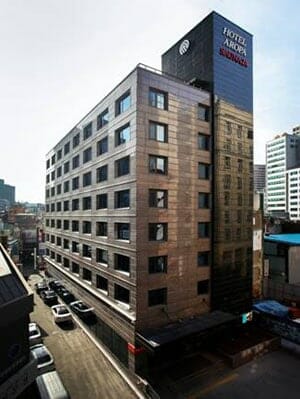
The Hotel Aropa is the latest Seoul hostelry to be scooped up by Singaporean investors. Image: Booking.com
Singapore-listed Datapulse Technology has announced that it has agreed to purchase the 127-room Hotel Aropa in Seoul for KRW 35 billion ($31 million), becoming the second Singaporean firm within the past month to acquire a Korean hotel, despite fears of a saturated market.
The acquisition gives Datapulse control over the freehold site for the property in the South Korean capital’s Bukchang-dong district, the hotel itself and relevant licenses and contracts, in a deal expected to close on March 14th, dependent on approval by shareholders.
Late last month, another Singapore-based concern, Ascendas Hospitality Trust announced it was buying the Ibis Ambassador Seoul Insadong for KRW 77.5 billion ($69 million). The listed trust had earlier this year purchased The Splaisir Seoul Dongdaemun.
Buying a Piece of Central Seoul
Datapulse said it would fund the purchase of the hotel, which has a gross floor area of 5,758 square metres, through internal resources and bank loans.
The mid-range property currently operates under a local hotel brand, and offers guests close proximity to the Seoul Plaza ten minutes walk to the north and is three minutes walk from the city hall metro station.
The Singapore consumer goods distributor said its purchase of the Hotel Aropa would be earnings accretive, lifting its earnings per share. The 38-year-old company has set up a holding structure comprising four subsidiaries, including South Korean entities, to acquire the hotel, which was built in 2013 and refurbished in 2016.
Not Quite a Fire Sale
Daniel Voellm, the Asia Pacific managing partner of hotel consulting firm HVS, said the sale of the Aropa reflected some of the pressure being felt in the hotel market because of what he called a “sharp decline in Chinese tour group visitors” stemming from the Chinese government’s opposition to the US-Korean missile-defense system, known as THAAD, which had caused tensions between Beijing and Seoul.
But he also added that the market presented opportunities for “non-core investors … to make their first moves into the hotel sector.”
“Overall, the valuation is attractive as Seoul hotels go, though the location in Bukchang-dong is not as prime as nearby Myeongdong,” Voellm said. “Any active asset management could help to enhance yields for the buyer further.”
Datapulse had said in October while it was conducting due diligence on the Hotel Aropa purchase that it intended to focus on acquisitions or investments in other hotels and hospitality assets as it expanded its property business.
More Hotel Transactions Expected

Corey Hamabata sees a pickup coming in the Seoul hotel market.
Corey Hamabata, a senior vice president for JLL’s hotels and hospitality group, said he thought the Seoul market was seeing varied dynamics, resulting in increased property transactions, especially among foreign buyers.
“By the time this year finishes, we will have seen five or more hotel transactions from foreign buyers,” Hamabata said. “Essentially, we view this trend as having to do with the buildup of new hotels in Seoul over the past decade, the subsequent decline and then recovery in hotel performance in 2017 and 2018, the excellent outlook for the Seoul market in the future and the limited availability of high-quality city center hotel assets available for sale in other markets in Asia.”
Hamabata agreed that the declining number of Chinese tourists had hindered the market, especially in 2017, at the height of China-Korea tensions, but indicated that the trend had started to reverse this year with Chinese visitors showing year-on-year growth starting in April.
The Seoul hotel market, he added, “remains flush with capital,” with the major factor constraining transactions this year being “a lack of high-quality product.” He said he expected more foreign investors, especially from Singapore and Hong Kong, to fill the gap.
Leave a Reply